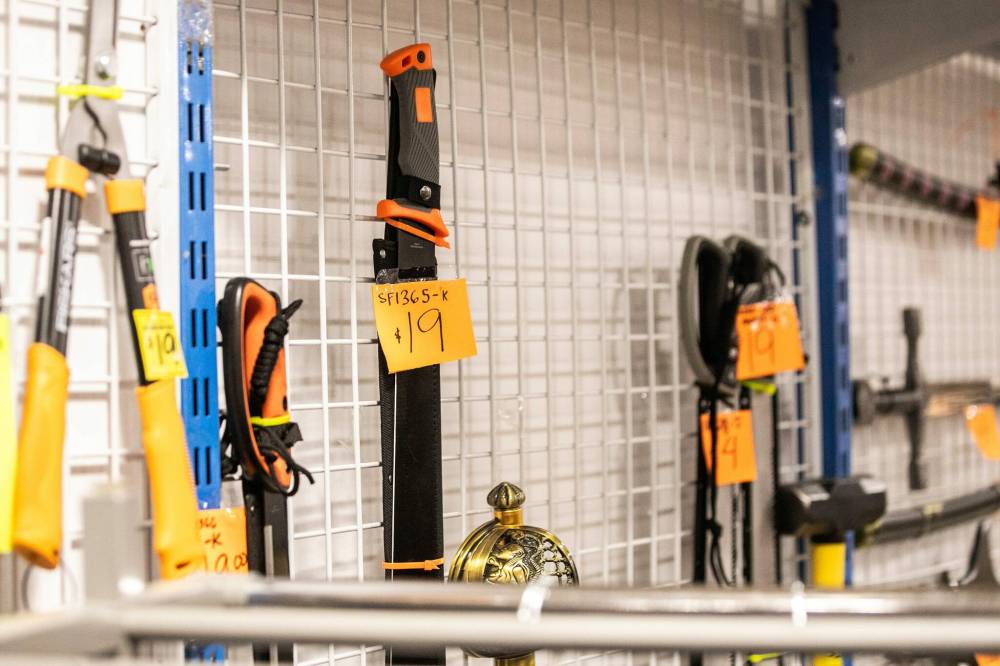Machete law may prove of little use
Advertisement
Read this article for free:
or
Already have an account? Log in here »
We need your support!
Local journalism needs your support!
As we navigate through unprecedented times, our journalists are working harder than ever to bring you the latest local updates to keep you safe and informed.
Now, more than ever, we need your support.
Starting at $15.99 plus taxes every four weeks you can access your Brandon Sun online and full access to all content as it appears on our website.
Subscribe Nowor call circulation directly at (204) 727-0527.
Your pledge helps to ensure we provide the news that matters most to your community!
To continue reading, please subscribe:
Add Brandon Sun access to your Free Press subscription for only an additional
$1 for the first 4 weeks*
*Your next subscription payment will increase by $1.00 and you will be charged $20.00 plus GST for four weeks. After four weeks, your payment will increase to $24.00 plus GST every four weeks.
Read unlimited articles for free today:
or
Already have an account? Log in here »
Hey there, time traveller!
This article was published 06/01/2025 (351 days ago), so information in it may no longer be current.
It has often been said that the road to hell is paved with good intentions. If that’s true, there’s a good chance one of the signposts on that road heralds Manitoba’s new restrictions on the sale of machetes and other long-bladed weapons.
The just-enacted Long-bladed Weapon Control Act seeks to limit the supply of machetes and long-bladed knives by making them harder to purchase. Now, no one under the age of 18 can legally purchase these weapons; adults may still acquire them, but they must show identification and vendors must keep records of who made the purchases.
The new law is supported by community activists and the Winnipeg Police Service. Even so, the inadequacies are pretty easy to spot.

First, given that the perpetrators of stabbing attacks are not solely minors, it is worrisome that adults are free to continue arming themselves with cheap and easily concealed weapons. And there is nothing in the law to punish adults who give a machete or knife to a minor.
This enormous blind spot is the byproduct of a harsh jurisdictional reality: provinces cannot prohibit weapons. That can only be done by the federal government through an amendment to the Criminal Code. As a result, no province can punish someone for carrying a machete or stop them from being freely circulated among wouldbe assailants.
Ultimately, a national ban on long-bladed weapons is the more appropriate way to go. That is the approach taken by the United Kingdom, which last fall made it illegal to both possess or sell zombie-style knives (long-blades with one serrated side) and machetes.
To help reduce the number of weapons in circulation, the U.K. government placed knife amnesty bins in communities throughout England and Wales to collect illegal bladed weapons; in the Essex police district alone, more than 1,000 weapons were turned in during the months prior to the enactment of the prohibition. In some instances, the government has offered financial incentives; one Luton wholesaler turned over 35,000 zombie knives in exchange for a payment of £10 (roughly C$17) per blade.
It should be noted that several loopholes — some of which could be relevant in Canada — have already been identified with the U.K. law. Two months after the ban went into effect, journalists at the BBC were able to purchase machetes and zombie knives from online retailers.
Government promised to work with legitimate online merchants to stop selling to U.K. addresses, but not everyone flogging these weapons online is considered legitimate.
It has also been pointed out that although the U.K. government has stated its ban will cut in half the number of stabbing attacks, machetes and zombie-knives are not necessarily the sharpedged weapon of choice in these crimes. For the year ending in March 2023, there were 244 U.K. homicides that involved “sharp instruments.”
Of these, 14 involved machetes, seven involved zombie knives and three featured swords. In contrast, 101 murders involved some manner of kitchen knife.
It’s a complex problem, to be sure. And it’s not clear that restricting sales or banning the possession of long-bladed weapons will reduce violent street attacks. Even so, Manitoba could have done more.
Although it cannot make possession illegal, it could have launched an amnesty program to reduce the number of long-bladed weapons in circulation. And it could be more vocal and join provinces like British Columbia which have already called on Ottawa to add machetes and zombie knives to the Criminal Code’s list of prohibited weapons.
As it stands, it appears Manitoba’s noble intentions will do little to stop violent stabbing attacks.
» The Winnipeg Free Press
